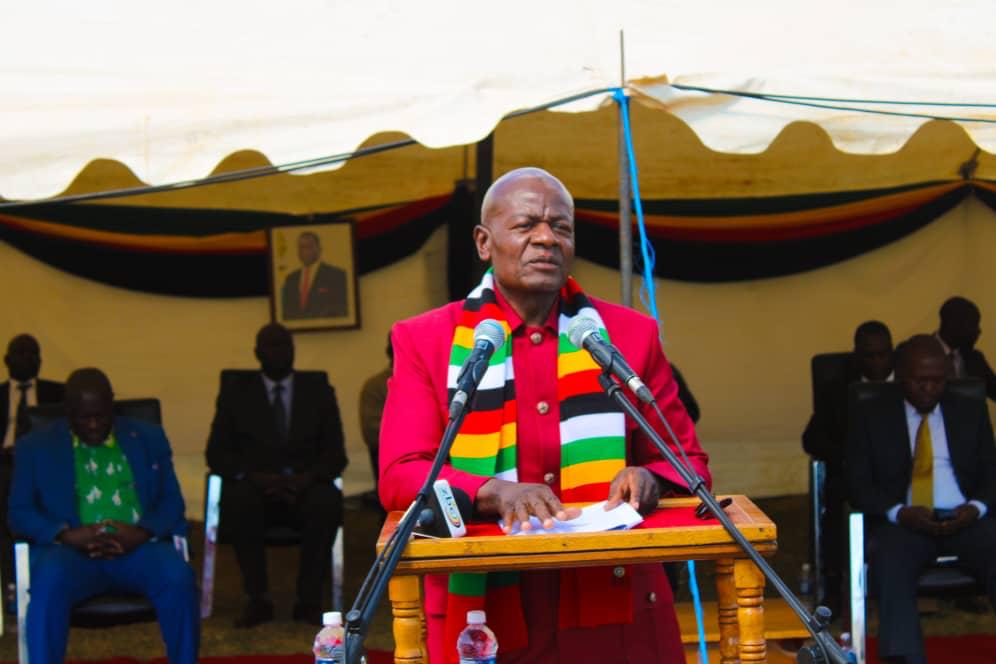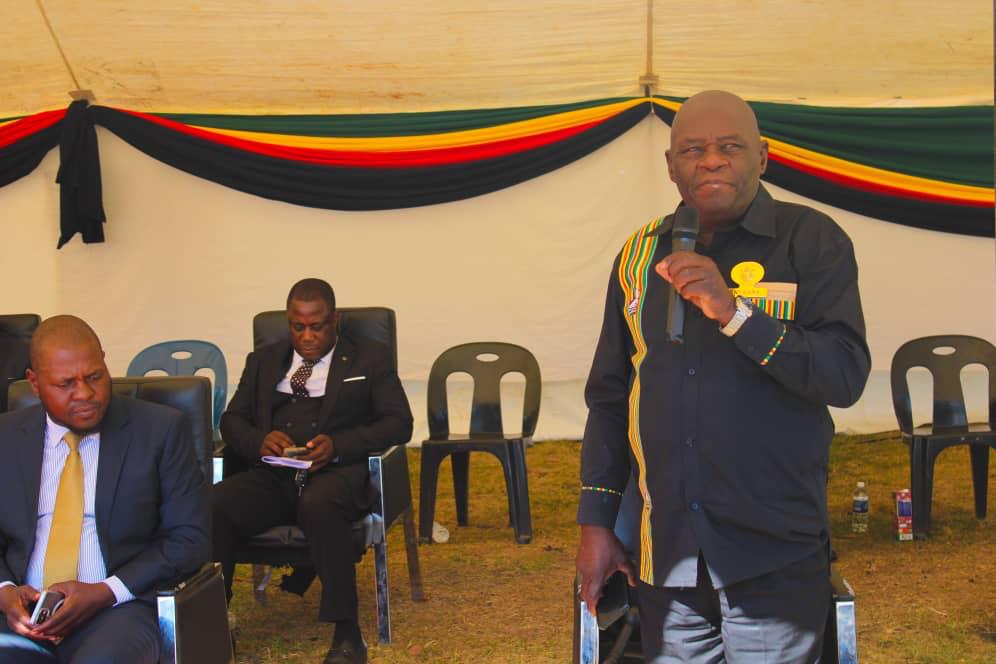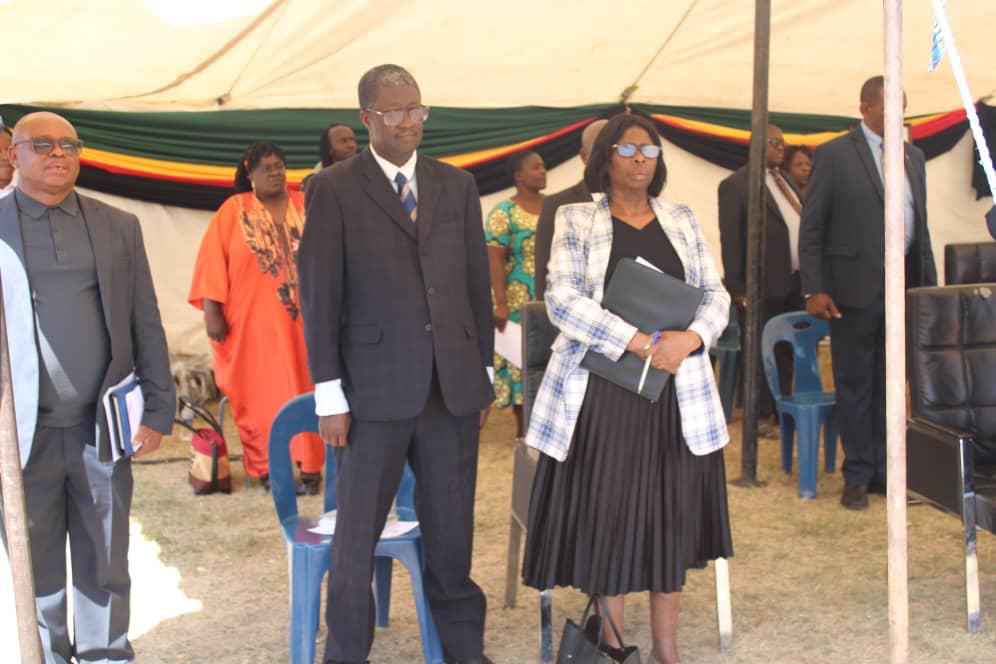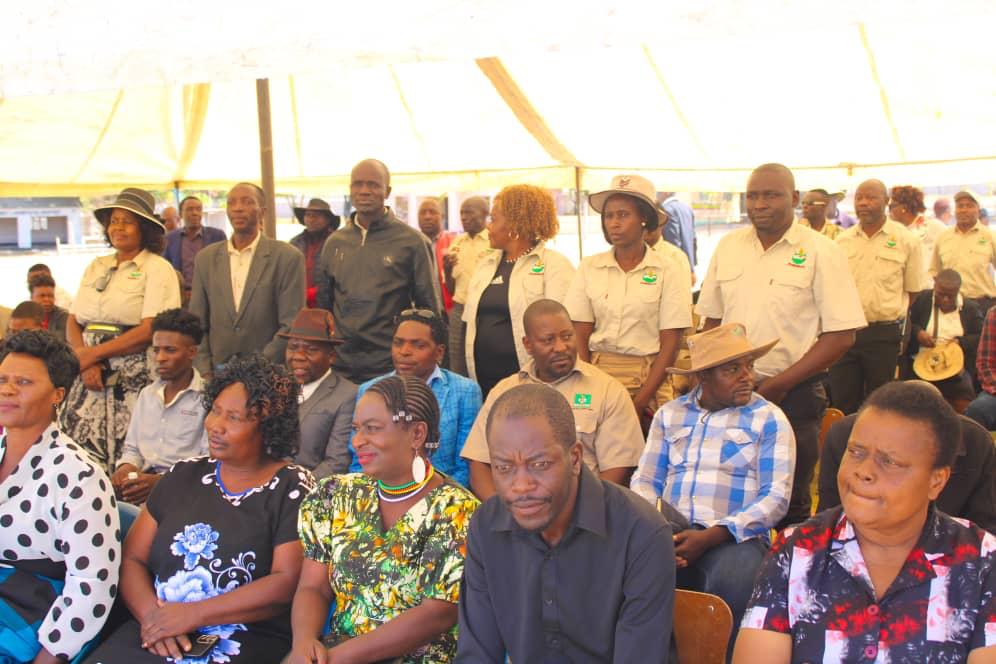Current Affairs
Minister Garwe Condemns Financial Irregularities

Local Government and Public Works Minister Daniel Garwe has warned local authorities against using proceeds from the sale of residential stands to pay salaries without government approval.
Addressing a meeting in Marondera attended by chief executive officers, councillors, traditional leaders, District Development Coordinators (DDCs), and Rural District Councils, Minister Garwe reiterated government’s commitment to strengthening governance.
He stressed the need to prioritise service delivery and collaboration across all tiers of local governance.
“Our communities look to us for leadership, accountability, and solutions. This meeting is about strengthening our collective resolve to deliver clean water, modern infrastructure, effective waste management, and functional service delivery systems that transform livelihoods,” he said.

Minister Garwe expressed concern over the misuse of state funds, cautioning councils against diverting stand proceeds towards salaries without ministerial approval. He emphasised that such resources should instead be channelled towards essential services such as road construction, water supply, and other basic needs.
“Our people continue to live in settlements with dusty roads instead of tarred ones because resources meant for development are being misused,” he added.
The Minister also warned against corruption involving councillors and executives, noting that unethical practices erode public trust. He called for integrity and accountability, urging stakeholders to shun the abuse of power and resources.
He condemned the unauthorised publication of council documents on social media, stressing that such actions compromise the integrity of council operations.
“The Government will not tolerate such behaviour in public offices. All communication must be done through appropriate channels,” said Minister Garwe.
He further highlighted that chiefs are the custodians of all communal land and must be consulted and involved in decision-making whenever development projects are undertaken.

The Minister urged councils to embrace transparency and uphold prudent financial management, reminding them that service delivery must always be people-centred. He also commended traditional leaders for their role in preserving culture, promoting social cohesion, and ensuring peace within communities.
Traditional leaders expressed gratitude to the Government for including them in decision-making platforms and reaffirmed their commitment to working with councillors and DDCs in resolving land disputes, safeguarding the environment, and supporting rural development projects.
The meeting also provided an opportunity for councillors and DDCs to share the challenges they face, ranging from limited financial resources to the need for improved road networks, schools, and health facilities.
Minister Garwe assured stakeholders that the Government was attending to their concerns and reaffirmed its support through the devolution fund and other infrastructure development programmes.
He urged civic leaders to mobilise communities to pay their dues, emphasising that revenue generation is key to sustaining quality services. “It is the responsibility of all of us here to ensure communities support councils by paying what is due,” he said.
The Minister directed councils to complete outstanding projects before embarking on new ones and to ensure equity in project identification by prioritising marginalised wards.
Zimbabwe Local Government Association (ZILGA) president, Cde Aaron Shamu, welcomed the renewed momentum brought by the Ministry’s drive for quality service delivery. He added that a review of councillors’ allowances would boost morale and effectiveness, ultimately empowering communities.
By the close of the meeting, a renewed sense of cooperation and shared responsibility was evident among all attendees. Minister Garwe urged leaders to return to their communities with a “spirit of action and accountability,” noting that the success of local governance directly impacts the prosperity of the nation.

The Marondera interface was hailed as a milestone dialogue, reaffirming the central role of councils, administrators, and traditional leaders in building resilient, inclusive, and prosperous communities across Zimbabwe.
Also present at the event were the Permanent Secretary for Provincial Affairs and Devolution for Mashonaland East Province, Mr Tavabarira Kutamahufa; Chief Director of Local Authorities and Inspectorate, Ms Khonzani Ncube; Acting Chief Director of Traditional Leadership Support Services, Mr Fungai Mbetsa; mayors, town clerks, CEOs, DDCs, councillors, traditional leaders, and other senior government officials.
Current Affairs
Minister Rwodzi Charts Path as Sector Takes Lead in GDP Growth

Itai Mazire
Tourism and Hospitality Industry Minister Barbara Rwodzi has implored players in the sector to embrace innovation, sustainability, and stronger partnerships to safeguard Zimbabwe’s tourism gains, as the industry now leads national GDP growth ahead of mining and agriculture.
In a speech delivered on her behalf by Tourism Permanent Secretary Dr. Takaruza Munyanyiwa at the Hospitality Association of Zimbabwe (HAZ) Summit and Annual General Meeting in Harare today, Minister Rwodzi said the country stood at a “historic crossroads” following its recent listing by Forbes as the best destination to visit in 2025.
“This is a well-deserved accolade which we should celebrate and sustain going forward. Congratulations, makorokoto, amhlope to the service providers of the tourism and hospitality industry of Zimbabwe.”
The Minister applauded the sector’s resilience in the face of pandemics, economic headwinds, and climate-related shocks, noting that the spirit of Zimbabwean hospitality remains unbroken.
“We have continued to smile, to serve, and to tell our authentic story, hence reaping the rewards now,” she said.
Giving an update on performance, Minister Rwodzi reported that international tourist arrivals grew by 9 percent between January and September 2025 compared to the same period last year, with strong traffic from the Americas, Africa, and Asia.
Domestic travel also surged by 20.9 percent over the same period, while the sector generated approximately USD 922 million in 2025 a 10 percent rise from the USD 839 million recorded last year.
“These are encouraging signs that our recovery is gaining positive traction. But future-proofing requires more than recovery it demands transformation,” she said.
Minister Rwodzi outlined five pillars she said would anchor the transformation of the sector: digitalisation; sustainable and climate-resilient tourism; human capital development; infrastructure and connectivity; and stronger branding and market diversification.
“The future of hospitality is digital,” she said. “We must move from brochures to big data, from paper-based booking to smart platforms.”
She urged operators to embrace online booking systems, virtual reality tourism aids, and other digital tools that enhance visitor experiences.
On sustainability, Minister Rwodzi said protecting Zimbabwe’s natural and cultural heritage was “not an expense it is an investment in the longevity of our industry.”
The Minister stressed the need to invest in human capital, calling on operators to work closely with academia to bridge skills gaps and develop tomorrow’s hospitality innovators. She highlighted the First Lady, Dr. Auxillia Mnangagwa’s gastronomy vision as a key avenue for elevating Zimbabwe’s culinary offerings.
On infrastructural development across the country, she said it remained central to competitiveness: “A tourist’s journey begins long before they reach our front desk — it begins on a road, a runway, or a mobile network.”
Minister Rwodzi reiterated that Government is committed to creating an enabling environment, pointing to the recent reduction of tourism fees by up to 50 percent to lower operating costs.
“Future-proofing cannot be achieved by Government alone,” she said. “The private sector is the engine of creativity, investment, and service excellence.”
Her call for collaboration was anchored on an African proverb which states that, “Tomorrow belongs to the people who prepare for it today.”
The Minister said the role of HAZ remained critical as Zimbabwe eyes increased international tourist inflows.
“The world’s eyes are turning towards Zimbabwe. We have the assets, we have the people, we have the passion so why not?” she said.
“To HAZ, your role has never been more critical. You are the unified voice of the hospitality industry. Your strength lies in your collective action.”
She said the ongoing summit provided a platform to “strategise, innovate, and build consensus” as the sector pushes towards Vision 2030.
“The potential is vast. The time is now. Let us build not just an industry, but a legacy,” said Minister Rwodzi.
Current Affairs
Apostolic Church Founder Paul Mwazha Dies at 107

Zimbabwe and the wider African Christian community are mourning the loss of Bishop Paul Mwazha, the revered founder of the Apostolic Church in Africa, who passed away today at the remarkable age of 107.
Bishop Mwazha, widely regarded as one of the continent’s most influential religious leaders, dedicated his life to the growth and spiritual guidance of his church, which boasts millions of followers across Zimbabwe and beyond. His teachings, rooted in faith, discipline, and community service, have left an enduring legacy that continues to shape generations.
The Apostolic Church in Africa under his leadership became a cornerstone of spiritual life in many communities, providing not only religious guidance but also social support and education initiatives. Church leaders have called for prayers as they prepare for national and regional mourning rituals.
Further details on funeral arrangements and memorial services are expected to be released in the coming days.
Business
Zimbabwe Bets Big on Biotech to Fuel Industrial Revolution


Dr. Eng. Willie Ganda
By Enia Dube
The Minister of Higher and Tertiary Education, Innovation, Science and Technology Development, Hon. Dr Fredrick Shava, has thrown his weight behind biotechnology as a key driver of the country’s industrialisation and modernisation agenda.
Speaking at the National Biotechnology Authority (NBA) Strategic Planning Workshop in Kadoma, Dr Shava urged the Authority to identify biotechnology-led opportunities that can boost national production and accelerate economic growth.
“Biotechnology serves as a key catalyst for NDS2 implementation, advancing inclusive economic growth, job creation, and sustainable industrial development,” Dr Shava said, emphasising the need to integrate biotechnology into national value chains to unlock a biotechnology-driven economy. He added that this would turn innovation into industry, knowledge into enterprise, and science into jobs.
The NBA has made notable progress in establishing a strong regulatory framework, promoting biotechnology research and commercialisation, and raising public awareness about the sector’s potential. The Authority has successfully commercialised products such as Mapfura wine and Cofsol cough syrup, and has several other biotechnology products in the pipeline.
Incoming NBA Board Chairperson, Professor Idah Sithole-Niang, echoed Dr Shava’s sentiments, emphasising that the Authority’s five-year strategic plan must meaningfully contribute to the attainment of Vision 2030. “This event marks a significant milestone in the Authority’s ongoing efforts to enhance the role of biotechnology in Zimbabwe’s socio-economic development,” she said.
The workshop aimed to realign priorities and resources in response to emerging technologies and global biotechnology trends, and develop a strategic roadmap to strengthen biotechnology as a key driver of Zimbabwe’s socio-economic transformation. The rapidly evolving global biotechnology landscape, including advancements in gene editing, bio-manufacturing, and climate-smart innovations, presents both new opportunities and challenges for Zimbabwe.
“We recognise the pressing need for an inclusive and forward-looking strategic plan that can navigate the complexities of the biotechnology landscape,” Professor Sithole-Niang noted. The workshop was attended by researchers, government officials, and NBA staff, who are optimistic about the potential of biotechnology to drive Zimbabwe’s economic transformation and achieve Vision 2030.
-

 Current Affairs1 week ago
Current Affairs1 week agoOperation restore order
-

 Crime and Courts2 months ago
Crime and Courts2 months agoMasasi High School Abuse Scandal Sparks Public Outcry
-

 Crime and Courts2 months ago
Crime and Courts2 months agoKuwadzana Man Jailed for Reckless Driving and Driving Without a Licence
-

 Current Affairs3 months ago
Current Affairs3 months agoMunhumutapa Day: Zimbabwe’s Newest Public Holiday Set for Annual Observance
-

 Current Affairs4 months ago
Current Affairs4 months agoBreaking: ZIMSEC June 2025 Exam Results Now Available Online
-

 Current Affairs1 month ago
Current Affairs1 month agoBREAKING NEWS: ZANU PF Director General Ezekiel Zabanyana Fired
-

 Current Affairs3 months ago
Current Affairs3 months agoGovernment Bans Tinted Car Windows in Nationwide Crime Crackdown
-

 Current Affairs2 months ago
Current Affairs2 months agoExposed: Harare GynecologistChirume Accused of Negligence, Extortion, and Abuse



